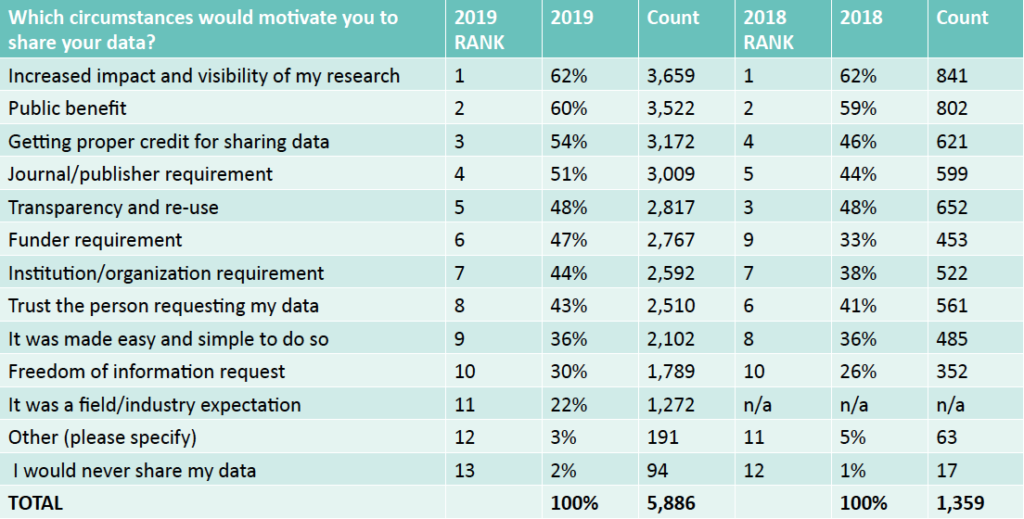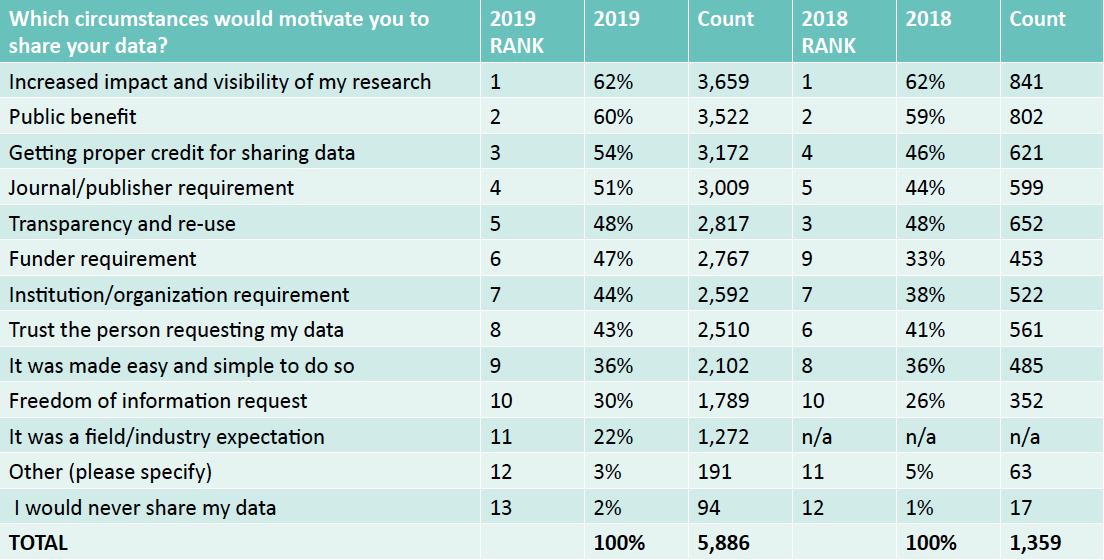OPEN SCIENCE
Crossref at a Crossroads. A blog post by Amy Brand in Scholarly Kitchen that looks back at the services that Crossref provides, and its role as a provider of free research and publishing data versus potential commercial offerings.
The State of Open Data 2019. Digital Science’s annual report around open data. It confirms a strong support for data sharing amongst 8,000 participants from more than 190 countries: “69% of respondents think that funders should make the sharing of research data part of their requirements for awarding grants.” Incentives around data sharing are shown below. The full report is on Figshare.
PUBLISHING
There was a lot of activity during last week’s Open Access Week with the motto “Open for Whom? Equity in Open Knowledge.” Highlights include:
Journal Editorial Boards: Is There Space for Geographic Diversity? This year’s motto for Open Access Week is equity in knowledge, and this blog post by Bárbara Rivera López addresses an important topic where journals can improve equity and diversity in publishing.
Co-creating Open Infrastructure to Support Epistemic Diversity and Knowledge Equity. A blog post by Yasmeen Shorish and Leslie Chan on ScholarLed makes the case for open, community-led, non-commercial publishing infrastructures.
Have We Reached Peak Hybrid? Delta Think have analyzed 110 Million records of scientific articles from a Crossref/Unpaywall data set and have estimated the distribution of open access content by business model and find that as a share of the open access market as a whole, hybrid articles have seen a decline since hitting a peak in 2016.
Open access popular with researchers but full potential remains untapped. A survey of 2,755 Taylor & Francis authors finds a poor awareness of open access schemes and how they could take advantage of open access options available to them. The full report is available here.
Unpaywall have announced Unpaywall Journals. These are “a data dashboard that combines journal-level citations, downloads, Open Access statistics and more, to help librarians confidently manage their serials collections.”
7 Steps towards greater equity in OA publishing. Scholastica’s suggestions on the Open Access Week topic, from improving open access publishing to better sharing of research outputs.
Ask The Chefs: Beyond the APC. A set of comments in Scholarly Kitchen on open access publishing beyond the article processing charge model. Certainly an important item widely discussed now. Another important item is pointed out in the above pieces by Brand, Shorish, Chan, namely supporting an open publishing infrastructure.
The publishing costs at EMBO. The publisher estimates that it would cost €9,040 per published research articles if all expenses for commissioned content, as well as the peer review and curation process of its highly selective journals, would have to be carried by authors.
Journals test the Materials Design Analysis Reporting (MDAR) checklist. Results from a trial amongst thirteen journals at different publishers (including PLOS Biology) to test a minimum checklist for reporting standards in the life sciences. A full analysis is to come, but 80% of authors and editors found the checklist useful, to different degrees.
EVENTS
The European Dataverse Workshop 2020 will be held on January 23 – 24, 2020, at The Arctic University in Tromsø, Norway.
FORCE 2020 will take place in Donostia-San Sebastián, Spain, from October 19 – 21, 2020.

Incentives for researchers to share data.
Credit (CC-BY): Science, Digital; Fane, Briony; Ayris, Paul; Hahnel, Mark; Hrynaszkiewicz, Iain; Baynes, Grace; et al. (2019): The State of Open Data Report 2019. figshare. Report. DOI: https://doi.org/10.6084/m9.figshare.9980783.v1
